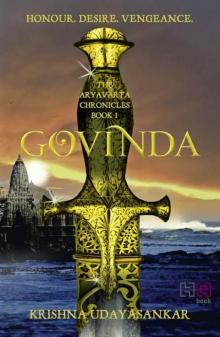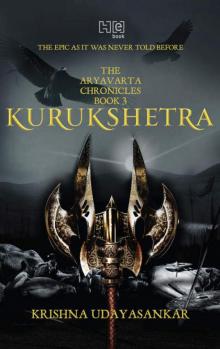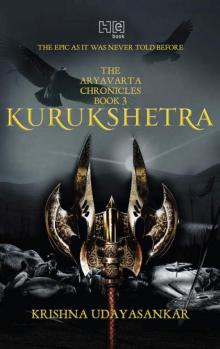- Home
- Krishna Udayasankar
Govinda (The Aryavarta Chronicles) Page 7
Govinda (The Aryavarta Chronicles) Read online
Page 7
‘Ah, so you want information,’ the blind man was inordinately cheerful. ‘Well, then I won’t trouble you much. Ask me all you like and I’ll answer.’
Doubt flickered black across golden-brown eyes. ‘And you’ll tell me the truth?’
‘If you know who I am then you know very well I’m sworn to the truth – a rather unfortunate arrangement, as many of us have since realized. But I suppose speaking the truth is a shortcoming in your line of work.’
The warrior drew an arrow from the quiver on his back. Instead of fitting it to his bow, he placed the tip at the maimed man’s neck. ‘You’re blind, but surely you can smell this. You know what it is … I’ve used it on the villagers outside. Didn’t you feel it?’
‘Yes, I felt a little of it. It’s not too badly made. I’ll admit you’re good, but not that good. There’s a difference between knowledge and enlightenment. You have only the former.’
‘Not that good? Why, you useless imbecile, I’m the best there is!’
‘If that’s the case then there’s nothing you need from me, is there?’ the blind man said, softly. ‘No matter, I’m ready to die.’
The warrior lost his haughty manner and withdrew his arrow. He bent down, bringing his face close to the other man’s. ‘There’s another weapon, isn’t there? One better than this? More dangerous than this?’ he asked gruffly.
‘Better? There’s nothing better than this astra. That’s why it’s called the weapon of Bramha, the Bramha-astra. But I thought you were the best among its makers,’ the scholar mocked.
‘I am. But the ingredients are rare these days …’
‘And men who can use them well, rarer still.’
The warrior hesitated, then reached out to lay a hand on the man’s fragile shoulder. ‘Uncle,’ he called out, carefully watching the disfigured face for the slightest reaction, ‘it is I … your very own Little Rudra. Don’t you remember the old nickname you gave me?’
The blind man laughed. ‘So it is you, all grown-up and now the most feared man in all Aryavarta. And still you skulk around, nameless, like a common assassin, wreaking death and terror. Tell me, Little Rudra, whom do you serve?’
‘I am master of my own self,’ the man bristled.
‘Really?’ the unseeing eyes bestowed a knowing look. ‘How is he … my old friend, Dwaipayana? I knew him once, when he was just Dwaipayana, before he became the Vyasa. He dreamt, even then, of ruling mankind, body and soul. I wonder what tiny scrap of a kingdom he has promised you in return for your services …’
‘The legacy of the Angirasas will be back in my hands.’
‘The legacy of the Angirasas! Hai! There is no legacy,’ the blind man hissed, with surprising rage for one so feeble. ‘We, the rebels, those whom you call Firewrights and piss on, have been the last defence for generations! Once, five great dynasties ruled Aryavarta, each founded by one of the sons of Bramha himself. Today, three of the five lines are as good as dead and the fourth flounders. I once believed we would rule these lands. But now I see that we shall not last long.’ He chuckled at an unspoken thought, but the sound grated in the warrior’s ears.
For the first time the warrior felt a twinge of doubt and discomfort. He nearly lost his temper, but resisted out of sheer will. Then he remembered that his momentary lapse was his own secret – the other man could not see. The thought brought back his cold, heartless equanimity, and he smiled.
‘There’s no reason I should help you,’ the blind man continued. ‘You can go ahead and kill me. That’s what you were ordered to do, isn’t it? To kill me? Or was that just something you wanted to do anyway?’ He thrust his chin up. ‘I was a young fool who believed that the Wrights alone could save Aryavarta. I didn’t see it would come to this.’
‘But it has. All this … for what …?’
‘Vathu! Is your contempt for your own so deep that you judge us like this? You’re more one of us than you care to admit! Look inside you, Rudra, inside the Firewright’s heart that you hide away from your father’s scrutiny and you will see how dearly I have paid for my beliefs. My children are dead, the order lies shattered, and I … I’m nothing more than a scarred fool who has spent his last years hiding from power-hungry men. I’m of no use to you, young one. Tell Dwaipayana that I’m no danger to him, either. I serve neither Emperor, nor any Firstborn. My allegiance lies with the Secret Keeper of the Firewrights.’
The warrior stared thoughtfully at the withered man for a while before he declared, ‘Then you serve nothing and no one. The Wrights are finished. Ghora Angirasa is dead. The Secret Keeper is dead.’ He began moving towards the door, intending to leave the old Firewright alone with his torment.
‘Wait!’
The departing visitor complied, a little surprised.
‘Then it’s time. Come here.’ The scholar forced himself to stand up on trembling, unsteady legs. He reached out and ran his hands over the younger man’s face and chest, smiling at the picture his fingers painted. ‘Ah, how you’ve grown! You’re a handsome man and your shoulders are strong. Your father must be so proud of you. If you can pretend for a moment that you’re still the same precocious little boy with a weakness for sugar candy, I’ll give you a small gift, as I used to. I’ll leave you with one final secret. In return, rid me of my guilt …’
‘Uncle …?’
The blind man nodded and reached out to embrace the other. Pulling the strapping warrior down a little, he whispered, ‘There’s hope, Little Rudra. A Secret Keeper lives. There’s hope.’
The warrior stiffened for a moment, completely taken aback at the revelation. He shook his head slightly as he said, ‘That plan fell apart decades ago. Like you, I too had great expectations of the one whom Ghora had hoped to make Secret Keeper. I thought he could perhaps put an end to this madness once and for all. But many things have changed over the years, as has the man on whom our hopes rested. He …’
‘He is the Secret Keeper. Some plans are made to succeed when everything falls apart. Don’t you see, Little Rudra?’
He did. Comprehension finally dawned in his eyes and a new kind of serenity filled him.
As if he too could see, the blind scholar laughed at the man’s reaction. ‘Now you understand me, don’t you?’ he said. ‘Now you see why I’ve held on to these beliefs for so long. Narayana!’
He tightened his feeble embrace, throwing all that was left of his strength into the moment. The gesture was affectionately returned. With soothing words, the warrior held the old man close, like he would a lost child. He used his other hand to pull out the knife from his belt and, with a silent prayer, slit open the scholar’s neck. The dying man’s head lolled forward to rest on the warrior’s chest, still-warm blood staining his skin in blessing and debt.
The two of them remained that way for a long time, till one was free of his pain. The warrior then carried the scholar’s body down to the nearby river, where he built a pyre and consigned the remains to its flames. He waited till the flames began to die down. Then he bathed in the river and made his way home.
9
YUYUDHANA WOKE UP TO THE MELLOW CARESS OF SUNLIGHT ON his face. It took him a moment to realize that it was not morning, but late in the afternoon. They had reached Kampilya a little before sunset the previous day. King Dhrupad, a portly man with inherited pleasant looks and a carefully-cultivated diplomatic manner, had made an exception to protocol and come forward to personally welcome Govinda. It had been a small, informal affair involving only the important officials of the kingdom, among them Satrajit, Dhrupad’s eldest son by one of his secondary wives. Satrajit’s valour and dedication were widely known and he served his nation faithfully as commander of Panchala’s armies as well as an able administrator of the kingdom’s affairs. Yuyudhana had felt a slight pang of discomfort as they were introduced. He had met enough men like Satrajit to know well that the prince would, in all likelihood, die for his country or even his father’s pride and arrogance, but history would not remember his name. His
unease had grown when he realized that Satrajit was not the king’s only offspring with due cause for displeasure. By right, Shikandin ought to have been standing where Dhrystydymn was, in a place of honour by Dhrupad’s side. Yet, it had seemed that the apparent anomaly caused more concern to Dhrystydymn than it did to Shikandin, who had merely fallen in next to Satrajit without complaint.
Yuyudhana had been on the verge of commenting to Govinda on these subtle undercurrents when Dhrupad had begun his warm speech of welcome. The monarch had been brief, but ended with the promise that a more fitting reception would be held later, after the travellers had rested and refreshed themselves. With that, the visitors were guided to well-furnished rooms.
The sight of a comfortable bed with its soft silk sheets, and the pleasant fragrance of incense in the room, had made Yuyudhana realize how tired he was. He had allowed the attendants to help him wash up, particularly enjoying the feeling of clean feet after days of travel. By the time Govinda had come to fetch him for a drink with Shikandin, he had been fast asleep.
Trying to muffle a violent yawn, Yuyudhana realized he had slept straight through the evening, the night and most of the next day. He gradually began to note the soft but unmistakeable sounds of life as the occasional person passed by. Faint sounds of laughter came floating on the breeze and were quickly gone, but the fragrance of jasmine that followed lingered. Groaning in mild protest, he forced himself out of bed, waving back the omnipresent attendant who ran forward to help. He tucked in his sleep-loosened antariya around his waist and shuffled groggily to the huge doorway that led to the narrow balcony that was attached to his room and ran all the way down the length of the building. Leaning against the red stone walls, he took in his surroundings.
The sprawling green lawns of the palace at Kampilya were well maintained, but lacked the contrived look that royalty usually favoured in their gardens. The undulating land had been only partly cleared and small copses dotted the entire landscape, shading it in old and new hues of green. A small stream flashed out of a particularly thick copse and wound back into a large wood that looked untouched and pristine. Many kinds of jasmine, and a red flower Yuyudhana did not immediately recognize, were in bloom on some of the trees and shrubs. To the north he saw the blue sparkle of the River Ganga as she flowed eastward beyond Panchala towards Kashi, Magadha and Anga before turning south to meet the sea. The river marked the border of the woods surrounding the palace and of the realm of Southern Panchala. Beyond the sparkling waters was the ‘other’ Panchala, as Yuyudhana had heard Dhrstyadymn refer to it – Northern Panchala, the land of kinsmen and enemies. Not so long ago the two kingdoms had been one, a great realm spanning from the lower Himalayan ranges in the north to the source of the River Charmanvati in the south. Now things were different. Very different.
Reflecting on the vagaries of life, Yuyudhana turned to look at the city of Kampilya, which spanned from the western wall of the palace out into the distance. It had every mark of a bustling trade city – right from the dense cluster of buildings with their multi-coloured awnings that formed the central market to the more spacious and less bustling residences of the nobility. Like the palace, the city walls as well as the public buildings and official residences were all built of a rich, red stone, but towards the northern part of the city, close to the river, it gave way to a less porous, more resilient grey rock. A variety of boats were docked along the river, the arrangements ranging from a seemingly chaotic mess of barges and small paddle boats at the point closest to the marketplace to the orderly calm around the immaculately maintained royal sailboat and smaller leisure craft. Here and there, spires of smoke rose to the sky in evidence of daily human activity, but the palace remained pleasantly secluded from the smells and sounds of the city.
Though he could not see it from where he was, Yuyudhana knew that a huge garrison lay to the south of the palace, shielding it and the rest of Kampilya from the lands beyond. The armoury and the officers’ quarters were closest to the royal palace, while the soldiers’ barracks and stables ran the entire length of Kampilya, till both garrison and city ended at the huge structure known as the Western Gate, the main entrance into Kampilya. Beyond the city, coloured flags dotted the landscape, fluttering in a strong breeze. These marked the Great Road that spanned Aryavarta from west to east.
Or so it’s claimed, a sardonic Yuyudhana noted. The Great Road, for the most part, served only the old kingdoms, which barely covered half of what was Aryavarta today. From Panchala the road ran west and north through Surasena into the Kuru kingdom. There it came to an abrupt stop at the edge of the desert. Only when that harsh nothingness had been traversed did the road suddenly blossom out of the earth again, as a short stretch that ran through parts of Salwa.
In stark contrast, the eastern part of the Great Road was long, well-laid and also well-defended. It ran past the capital of Magadha almost to the borders of the empire. A series of small but adequate roads branched off from the Great Road into the various vassal kingdoms of Anga, Kashi–Kosala and others. With small towns, inns and resthouses dotting the countryside, these roads formed an alternative route that ran parallel to the Great Road, though much further south.
But, of course – it’s Jarasandha’s lifeline, his passage to Aryavarta.
The Southern Roads, as they were called, came as far west as Vidharbha but went no further. Not into the tract of rocky deserts that was part of the Anartta kingdom. Not to the western coast of the empire. Not to Dwaraka.
Yuyudhana sighed, and returned to tracing what he could see of the Great Road. Only then did he realize that what he had supposed was a cloud was really dust, dust that only a huge convoy could raise. He dismissed the idea of an army – he would have seen the glint of armour, perhaps even felt a slight tremor from the marching of elephants before he had noticed the dust. This was, beyond doubt, a civilian convoy. He looked on in disbelief as the procession progressed along the road. He could see the faint outlines of slow bullock-carts, men and women walking alongside them herding pitifully small and most likely starved herds of cattle and sheep.
‘By Hara!’
‘Refugees,’ a voice explained.
Yuyudhana turned as Govinda walked in from an adjoining room, shutting the connecting door behind him. He came to stand alongside his cousin and continued, ‘That’s the latest flood of refugees, from the northern and north-western frontiers of Aryavarta. Rather, what used to be the frontier. It’s now under the control of Yavanas and soon to legitimately become their lands. Shikandin’s men report that this lot,’ he gestured toward the oncoming cloud of dust, ‘are all that’s left of nearly four hundred villages. For each person that has made it this far, at least three have died, either fighting to protect their homes or, worse, while crossing the desert.’
Govinda raised a disdainful eyebrow at the expression of shock on Yuyudhana’s face. ‘Does it really surprise you? The Yavanas, the Huns, the Pahlavas, have all realized that if we can cross the mountains and conquer them, they can do the same to us. Drawn by the allure of Aryavarta they’ll find a way over the White Mountains or around it. And here we are, an empire in name but really just a fragmented bunch of petty rulers ready to squabble with each other at the slightest provocation. But that’s how it’ll be as long as there’s only so much fertile land to till and many mouths to be fed, and, of course, many coffers in each kingdom’s treasury to be filled.’
‘I didn’t know that Panchala offered sanctuary.’
‘Not sanctuary. But in a city like this there are nobles who need slaves, attendants, prostitutes. I believe even the Chief Attendant of the palace has ridden out to get an early pick …’
Govinda tried to keep his tone casual, but it betrayed his acrimony. ‘Sometimes people stay willingly, believing that life may be better here than elsewhere. Most of the time they’re sold one by one, by their own families, for food. In the cities, it’s mostly women. Along the farms and pasturelands it’ll be the children …’
‘B
ut where … Where are they headed?’ Yuyudhana asked.
‘Magadha. They go to join Jarasandha’s teeming armies. All the men, without exception, and even some of the women are willing to serve however they can … What else can they do? They’re not safe in their own homes, nor are they welcome anywhere else. So they’ll join the Emperor’s forces, and when the real invasion of Aryavarta does happen they’ll be the ones to die first. But they probably believe they have that one chance to fight back for their families, for what they’ve lost. It almost makes me wonder if it’s really worth defying Jarasandha …’ Govinda muttered the last few words before he trailed off.
Yuyudhana, however, did not miss a word. He knew well what was on his cousin’s mind and had no stomach for it.
‘Yabha! So that’s your excuse then, Govinda? We should defer to Jarasandha? We should hide and run from him because he’s not above using desperate men, not above throwing their lives away to feed his ambition? We should let him destroy us just because he offers us the semblance of a united empire? You wouldn’t face him before, and even now you hesitate, don’t you?’
‘Who’s “we”, Cousin? Is that the royal “we”, or “we” the common people?’ Govinda snidely quipped. ‘Only the royal “we” find the notion of an empire, any empire, disconcerting. The common people need it. Small nations don’t have the resources to do more than survive. To maintain a great army, one capable of defending a realm the size of Aryavarta, we need an immense agrarian base and, also, the capacity to match the army’s requirements for weapons, land, transport, sustenance and whatever else they may need. In effect, the functioning of an empire takes coordination and efficiency, not just with the army but also across other essential activities – settlement, irrigation, pasturing, mining and production, all have to be efficiently guided.’
‘Hu!’ Yuyudhana dismissively waved his hand. ‘This is just the kind of dung-pile answer that I’d expect from one of the Faithful, the Firstborn-loving spineless monkeys that the empire is full of! If your empire works, shouldn’t it have brought us specialization? But, no, instead of learning to be excellent at various skills, we find the same, mediocre replication of mundane activities in each village, hamlet and city – the same old medics, the same old smithies, the same old priests and scholars, the same old stagnation. What else do you expect, Govinda, if you rely on common peasants to provide the solution? It is arguments like yours that have brought us to this pathetic state!’

 Govinda (The Aryavarta Chronicles)
Govinda (The Aryavarta Chronicles) The Aryavarta Chronicles Kaurava: Book 2
The Aryavarta Chronicles Kaurava: Book 2 The Aryavarta Chronicles Book 03: Kurukshetra
The Aryavarta Chronicles Book 03: Kurukshetra The Aryavarta Chronicles Kurukshetra: Book 3
The Aryavarta Chronicles Kurukshetra: Book 3